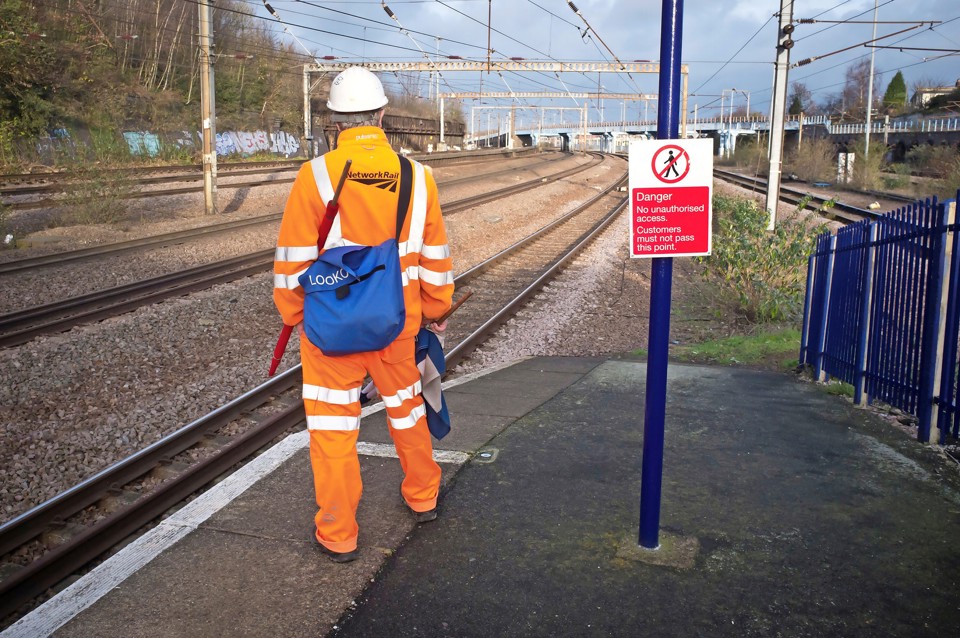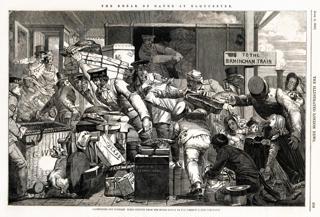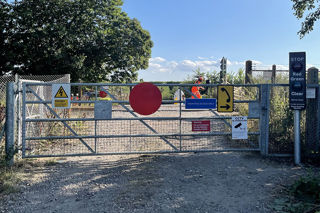If you have a railway pension, this subject probably matters more to you than anything else in this issue of RailReview. The Pensions Regulator thinks your retirement pot needs a lot more money pumped into it. And that money comes 60% from your employer, and 40% from you.
If the result is a large increase in contributions, it is going to hit your pocket quite hard. Some employers think their contributions could be so onerous it would put them out of business.
Stagecoach was evicted from three franchise competitions because it declined to accept the risk of taking on unknown future pension contributions over which it had no control. Stagecoach then launched legal action against the Department for Transport over its disqualification.
Within days, Arriva also launched legal action over the way it was ejected from the East Midlands franchise. And the RMT has threatened a national strike if members’ pensions are not maintained.
A senior industry source says: “This is the Department for Transport going through the back door to cut the cost of a gold-plated pension. It’s a ‘defined benefits’ scheme that’s still open to new members and there aren’t many of them left.
“Instead of having a grown-up discussion with the trade unions about this and being up front with the fact that they want to cut the cost, they’ve decided to link it to franchising, so essentially all the risk transfers to the private sector instead.”
The Rail Delivery Group has informed the Department for Transport that, unless a solution can be found, the pension black hole is sufficient to derail franchising altogether, regardless of what the Williams Review may do.
Talk to the freight operators and private companies that run chunks of the former British Rail engineering businesses, and they see the pension deficit as a problem so huge that it could derail their businesses entirely.
“The bottom line is that the risk mechanism in recent bids doesn’t cover what would have to happen in terms of employee contributions,” said a source. “If the employees threaten to strike over any tampering with the scheme, the employer would end up funding the gap. Because the Pensions Regulator is independent of Government, it can do whatever it wants. It can insist the deficits are plugged, over whatever timescale it chooses.
“This lays bare that the heart of this is an issue in Government. It is not of the rail industry’s making; it’s the Government trying to be cute with its finances. And that has really spooked the Regulator, because in the past it knew the Government stood behind the franchises.”
There’s a wide range of opinion on this. The drivers’ union, ASLEF, thinks the pension pots of passenger train operators are in pretty good health. ASLEF argues that the Pensions Regulator has got the wrong end of the stick in treating it as a private pension fund; with passenger services underwritten by Government, the drivers’ union says it is effectively a public-sector pension.
The basics
The Railways Pension Scheme (RPS) has 350,000 members, of whom 99,000 are active and paying into the scheme. It is one of the country’s ten largest pension funds. At the end of 2018, it had assets of £28.2 billion and paid a little over £1bn in benefits in the year.
The fund is divided into 107 separate sections across the industry. The largest is Network Rail with 48,000 members, of whom 23,000 are active. They have assets of £7bn.
The chairman of the Railway Pensions Trustee Company is Chris Hannon. He is also pensions director for Genesee & Wyoming, the owner of Freightliner, having previously held a similar role at Network Rail.
“The RPS was spun out of the British Rail pension scheme at the time of privatisation in 1994. Where there was one pension under BR, it was split into lots of different sections. They each have their own independent section of the overall scheme,” says Hannon.
“If you think of the RPS as a cake, there are 107 slices. Each is managed like a separate scheme within the whole. The specific package for each section differs as a result of changes in membership, investments and funding. So some sections will be open to new members for defined benefits, and some sections may have closed to new members.”
The RPS is unusual these days in providing defined benefits and being open to new members. It is also unusual in having a shared cost arrangement in which members contribute on a varying basis over time, depending on the cost and funding of the section.
There is one common administration, which is still based at the old BR pensions office in Darlington, with another office in London. The Railway Pension Trustee Company looks after all the sections of the RPS. It is made up of 16 directors. Half are employer nominated and half are nominated by members. Train operating companies, freight and engineering firms, unions and pensioners are all represented.
Beneath that are two subsidiaries: RPMI and RMPI Railpen. They have about 350 people running the pension scheme.
The Pensions Regulator has identified a potential shortfall in the RPS that has risen from £4.8bn to £7.3bn in the three years between 2013 and 2016. It wants increased payments to counteract the shortfall. Yet every passenger train operator and Network Rail, which together make up a majority of the industry, say their sections are each in surplus. Network Rail says its section has “a very healthy funding position” and “we do not expect any material change”.
Hannon says: “You ask me about the numbers that have been reported as Pensions Regulator identified deficit. These are not Trustee numbers. I cannot say more. Pensions in payment continue to be paid in full.”
The trustees recognise, he says, that hundreds of thousands of people depend on their judgment of what is prudent. Hannon is keen to stress that “prudence” is the watchword behind every trustee decision, and is based on years of “intimate familiarity” with the scheme and understanding of the industry.
In a letter sent last June during discussions with the industry about a possible funding solution, the Pensions Regulator said the deficit “drives our desire to ensure substantially more cash is paid into the sections, commencing in the short term”. It added that the DfT “has remained consistent that the schemes are sponsored by private companies that must take responsibility”.
The BBC reported that the letter was sent to Calum Cooper, a partner in the pensions consultancy Hymans, which has been advising the Rail Delivery Group.
Led by the RDG, the industry put forward a compromise that would see train operators contributing an additional £600 million over a decade. The Government would take up the rest.
On April 24, there was a meeting between RDG, the Department for Transport, the Pensions Regulator and RPMI. A source says that, at this meeting, the Regulator stated that the only credible solution offered was the one put forward by the industry.
That proposal had been submitted to the Department for Transport one year earlier. During that year, the source said there had been no formal response from the Government. “We do not know why they have not come back to us with a detailed proposal,” said the source.
Stagecoach
The pension debate was publicly ignited on April 10, when Stagecoach announced it had been disqualified from three franchise bids. It lost East Midlands to Abellio. For South Eastern, it was bidding with Alstom. And for West Coast Partnership, it was bidding with Virgin and SNCF.
It raised the prospect of both the Stagecoach and Virgin names disappearing from the industry within months – East Midlands Trains finishes in August and West Coast in November.
Stagecoach said at the time: “A senior Department for Transport official verbally advised that we had been excluded from all three competitions for submitting non-compliant bids, principally in respect of pensions risk.”
In May, the company offered more detail in an announcement to the London Stock Exchange. It said that in its bids, it had refused to accept the potential pension risks that the Department for Transport requires operators to bear. It said: “The full extent of these risks is unknown, but we estimate them to be well in excess of £1bn.”
It then launched legal action against the Department for Transport over its disqualification from the East Midlands franchise competition. In a claim issued at the High Court, Stagecoach alleged that the DfT “breached its statutory duties”.
Group Chief Executive Martin Griffiths said: “Despite our continued requests for full transparency around these matters, many fundamental questions remain unanswered. We have had no option but to commence legal action to ensure the DfT’s opaque decision-making is subject to proper public scrutiny.”
Stagecoach also prepared a claim for a Judicial Review over the East Midlands decision and was considering further legal action against the DfT over the South Eastern and West Coast Partnership franchises.
A few days later, Arriva confirmed that it too had launched legal action over the way it was excluded from the East Midlands franchise competition.
This was the latest of several legal actions against the contractual decisions made by the Department for Transport this year. Eurotunnel sued the DfT over the way it let contracts for additional cross-Channel ferry services to cope with the consequences of a no-deal Brexit. Eurotunnel argued that the process was anti-competitive. The DfT settled out of court for £33 million. Subsequently the ferry firm P&O also sued the DfT, arguing that the £33m paid to Eurotunnel was itself unfair and anti-competitive.
A Department for Transport spokesman responded: “We have total confidence in our franchise competition process and will robustly defend decisions that were taken fairly.”
Stagecoach said that since privatisation, the train operator’s obligation to the RPS had been limited to paying the employer contributions during the franchise. No train operator had been held responsible for any deficit remaining at the end of the franchise, nor had any train operator been entitled to benefit from any surplus at the end of the franchise.
It told the Stock Exchange: “That funding approach was determined by the RPS Trustee Board, taking comfort from its understanding that the Department for Transport effectively stands behind any RPS liabilities as each franchise ends.
“More recently, the Pensions Regulator has questioned the extent to which RPS does in fact benefit from that underpinning support. We understand that the Pensions Regulator considers there to be a deficit of up to £7.5bn across the franchised train operators and is seeking significant additional contributions which are as yet unquantified.”
The DfT’s protection was limited to the 2019 valuation of the pension scheme only. So the company would have taken the full risk of any increased contributions following the next valuation of the pension scheme, due in 2022. It would also have to accept the risk that employees might not accept increased pension contributions, leading either to industrial action or to a need for the operator to fund their increases.
To have accepted that risk, said Stagecoach, would have been “contrary to the success of the company and also contrary to the interests of employees, customers and the franchise”.
It included pension increases in its bid forecast, but sought additional protection beyond what the DfT had offered, “to ensure… increases in pension contributions would be limited to a manageable level which it would be reasonable for a train operator to bear”. It added that Virgin, SNCF and Alstom supported this position.
The Department maintained that Abellio had been the only compliant bidder for East Midlands. Subsequently Labour’s shadow Transport Secretary, Andy McDonald, told MPs that Abellio’s bid had also been non-compliant, and accused Transport Secretary Chris Grayling of misleading Parliament.
Grayling was obliged to respond to a series of detailed questions on the Department’s choices. They were contained in a joint letter from the chairs of the Transport and Work & Pensions Select Committees, Lilian Greenwood and Frank Field, both Labour MPs.
In this, he claimed that bidders for franchises were “well aware of the Pension Regulator’s concerns in advance of the issue of the Invitation to Tender”. That was in October 2018.
In the letter, Grayling wrote: “The Stagecoach bid was non-compliant with subsection 4.1.2 which states that ‘The Department expects to receive Bids that contain no qualifications.’” He concedes that there were numerous concerns from South Eastern bidders in relation to pensions, which led to an invitation to resubmit pension-specific elements of their bids separately last autumn.
He also said: “On all previous franchise competitions, the Department has required TOCs to be fully liable for their share of pensions contributions, and for the risk of those contributions changing, during their franchise term. This includes any increase to future service or deficit contributions that arise during the franchise term.
“The approach adopted on East Midlands, South Eastern and West Coast Partnership competitions mean that the TOC will be exposed to no additional risks or demands when compared to current TOCs.”
He went on to suggest that the risk would in fact be lower than on other franchises, because his department will share some of the pension deficit risk under a new mechanism. And he claimed: “Pension costs are a relatively small part of a TOC’s revenues and operating costs.”
Passenger train operators – and unions
The Department for Transport cannot have been in any doubt about the potential impact of its choices.
On April 1, RDG Chief Executive Paul Plummer wrote to Rail Minister Andrew Jones. It was his second communication on the subject within a month. It was a private letter, but it has since been leaked.
It referred to a proposed risk-sharing format in which train operators would increase pension contributions. This, wrote Plummer, would “provide the Pension Regulator, trustees and employers with documented support against unexpected outlier events. ” In other words, it would confirm that pensions are, in effect, backed by the Government.
Plummer was blunt in the letter: “…if it is not supported by Government we believe the consequences for taxpayers and customers are clear.”
He detailed those consequences:
- “Contribution increases would be significant and we believe they could break the scheme.
- “There could be a very significant impact on the taxpayer through the adverse financial effect on franchise bids.
- “The ability for the DfT to let future franchises in circumstances of such uncertainty will be put in jeopardy, whatever the outcome of the Williams Review.
- “Stakeholder support will evaporate leading to lengthy and costly legal disputes.
- “There would almost certainly be widespread industrial action.”
This letter came nine days before Stagecoach was ejected from the franchising process.
ASLEF has an employee director on the Railways Pension Scheme. Unusually, it says there is no difference in approach between employers and employees when it comes to the pension fund.
Because the RPS is a shared cost scheme, the union has a strong reason to make sure contributions for both employer and employee remain affordable. Employees generally pick up 40% of any increase, sufficient to make a significant dent in their income, though some employers pay more than 60%.
ASLEF takes issue with the view of the Pension Regulator, claiming it fundamentally misunderstands the nature of the industry. Its spokesman, who prefers not to be named in this article, says: “We reject the premise that there is a problem. Nothing has fundamentally changed since privatisation.
“The RPS is unique in that the employers are short-term and have few assets. On paper they don’t look strong employers. But the state is always the operator of last resort. The actuaries and us have always seen it as a secure scheme with long-term interests. The state will continue the employment of scheme members and the operation of the TOC if it falls into trouble.”
The ASLEF spokeman added that the RPS was secure. “It isn’t seen as weak,” he says. “And there’s evidence: the failure of East Coast several times, and the earlier failure of Connex, show the Government has always picked up.
“The results we have from 2016 show every TOC fund is in surplus. The Regulator has said that we need to knock down the valuation by about 25%, as this is a private fund and the employers are not strong. That would throw pretty much all the funds into deficit.”
But he adds that this is a long-term growth industry. “We are building new lines and employing more people,” he says. “New people are coming into the scheme. It is not stagnant. Employers and unions are not often on the same side, but on this we are singing from the same hymn sheet. We think the pension scheme is sound.”
ASLEF is saying that the Regulator has got this wrong. “Employers come and go, but the employment itself is stable,” its spokesman adds. “These are Government contracts and ultimately they will continue one way or another. The trains won’t stop running, and that is enshrined in the 1993 Railways Act.”
The freight and engineering companies
“The only healthy pension is one that is supported by a healthy business, one that can afford the contribution rates,” says the head of a prominent private sector rail business. “If these contribution rates are continually going up, then we can’t afford it. It wipes millions off the bottom line and it will bankrupt the business.”
He explains that the valuation the pension fund puts on its investments is “way off the scale” compared with where it should normally be. Other pension funds, he says, take a more pessimistic view of how their investments will perform. The RPS assumes a higher rate of return.
“They look at the money coming in and the money going out. How many people are paying in, the age profile of contributors and the average age at death of people in the scheme. They’ve got railway people dying at an average age of 92, which is highly unlikely. These are the things you twiddle with in order to adjust the value of the deficit.
“Now we are being told our contributions are going up on this overly optimistic view, to levels that are just not affordable for a private business to sustain.”
Another source said that the driver-only operation controversy pales into insignificance compared with pensions. “The pension deficit is the biggest problem facing the industry right now,” he says. “If you’re going to have a strike, have it about the pension scheme. It is far more important to the long-term health of the industry, and therefore to the welfare of the people who work in it.”
He adds that the RPS is not a public pension scheme, but a private one. “And that is what has dawned on the DfT,” he says. “If Labour get in and nationalise the whole thing, the deficit that goes on the Treasury’s balance sheet is massive. It far outweighs any negotiations on the future of franchises.”
Pension providers give businesses a Covenant Level, ranked from one to five, with one being the best. These levels are based around a company’s performance. The worse a company performs, the more the pension fund demands is put into the pot.
“The key thing with the TOCs is that they are all Covenant Level 1,” says this source. “They are seen as Government guaranteed, because the liability goes back to the Government at the end of a franchise. We have to account for the deficit on our balance sheet, so our Covenant Level is lower. But for them it never comes home to roost. That’s why ASLEF agrees with the TOCs.”
He says that all the contractor businesses like Balfour Beatty and Colas, the people who took on parts of the former BR, and all the freight operators, now have this cross to bear.
“If you talk to any of the private businesses that have to suffer this pension scheme, you will find we are all extremely vexed and stressed by it,” he says.
“Some of the private companies are gently winding down their schemes. They won’t admit it to you. But they are not letting new recruits join their final salary scheme unless they have been in the railway since before 1995.
“And some firms simply don’t recruit people who are pre-1995. This is why: they have to reduce their membership of the scheme to get their exposure down to a survivable level.”
What next?
At the time of writing, the separate legal actions by Stagecoach and Arriva against the Department for Transport remain active. Speculating on the consequences would be rash.
Industry sources say the DfT appears determined to push all risk onto the private sector, even though the RDG has painted a very grim picture of how that will affect the industry. Plummer says it could break the scheme. And that wasn’t public posturing; it was in a private letter to the Rail Minister.
In the eyes of the Pensions Regulator, a great deal more money has to be found from employers and employees if the pension fund is to remain big enough to pay out in a robust manner for the long term.
Whatever franchising was about, the industry fears the East Midlands deal indicates it has become more about which company is prepared to bear financial risk, rather than which company can come up with the most innovative way of improving services for passengers.
As one executive put it, franchises have become pension funds with passenger services attached. And Stagecoach says this cannot possibly be in the interests of Government, of shareholders in private companies, of railway employees or of passengers.
The boss of one company in the pension scheme says: “The level of naivety that employees have over their pensions is breathtaking. We had a chap who was 56 years old and had 40 years in the scheme. And he had never even read his pension return.
“If one good thing comes out of this – and there won’t be many – it will be that railway people will have a better idea of what they are doing with their money, and what it is actually worth.”


















Login to comment
Comments
No comments have been made yet.